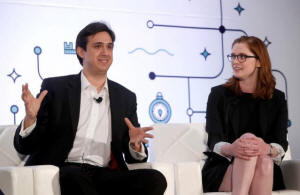|
Exclusive: Tezos founders push for legal
bailout from Swiss foundation
 Send a link to a friend
Send a link to a friend
 [December 01, 2017]
By Steve Stecklow, Anna Irrera and Brenna Hughes Neghaiwi [December 01, 2017]
By Steve Stecklow, Anna Irrera and Brenna Hughes Neghaiwi
NEW YORK/ZURICH (Reuters) - The couple
behind the embattled Tezos cryptocurrency tech project wants the
Swiss-based Tezos Foundation to cover their costs for lawsuits accusing
them of fraud related to an online fundraiser it ran, people familiar
with the matter told Reuters.
That would mean contributors to the fundraiser, known as an initial coin
offering, would be indirectly footing the bill. The contributors have
yet to receive anything, even though the project in July raised $232
million. The Tezos Foundation, which controls the proceeds, so far has
not agreed to the couples’ request, the people said. The foundation was
established to develop the project.
The Tezos project and its founders, Arthur and Kathleen Breitman, are
facing three class-action lawsuits in the United States. Plaintiffs
allege federal securities law violations and that the fundraiser
defrauded participants, who were told they were making non-refundable
donations to the Swiss foundation. The lawsuits are seeking refunds and
damages.

The project has yet to launch, which is required for contributors to
receive new Tezos digital coins, called Tezzies. Meanwhile, their
contributions – made in bitcoins and ether – have soared in value.
Both lawsuits name as defendants the project's young founders, their
Delaware-based company, Dynamic Ledger Solutions Inc (DLS), which owns
the Tezos source code, as well as the Zug-based Tezos Foundation.
A Reuters investigation in October found that the couple was in a bitter
dispute with Johann Gevers, the foundation's president, over control of
the project.
Arthur Breitman told Reuters in Zurich on Thursday that he would not
answer any questions. Gevers said he could not comment on the Breitmans'
request that the foundation indemnify them against legal actions.
Georg von Schnurbein, co-author of a book on Swiss foundation
governance, said he saw no reason for the Tezos Foundation to cover the
Breitmans' legal costs.
"In my opinion, there is no reason for that because their activities
were connected to their Delaware company, not to the foundation," he
said.
The foundation's three board members could be held liable by Swiss
regulators if they were to agree "because the lawsuits have nothing to
do with the foundation purpose, only with the collection of money prior
to that," von Schnurbein added.

Further complicating matters is the contractual agreement between DLS
and the foundation that was signed in June. The agreement, which is not
public, governs the sale of DLS and its intellectual property to the
foundation.
The agreement, a copy of which was reviewed by Reuters, states that the
Swiss federal supervisory authority for foundations must approve the
agreement. It also indicates the approval was required before the
fundraiser took place.
However, a spokesman for the department that oversees the authority told
Reuters, "It is not the Foundation Authority's task nor its
responsibility to approve private law agreements."
[to top of second column] |

Tezos co-founder and CTO Arthur Breitman and his wife and co-founder
Kathleen Breitman respond to questions during the Money 20/20
conference in Las Vegas, Nevada, U.S. on October 24, 2017.
REUTERS/Steve Marcus

The contract also says that some Tezos software code would be put in
the public domain prior to the fundraiser. The foundation later told
Reuters that it has a license to release the code and will do so "at
an appropriate time before the launch of the main network."
Documents provided to participants in the fundraiser did not mention
the required approval by the Swiss authority or the timing of the
source code's release.
Stephen Palley, an attorney at Anderson Kill in Washington who
focuses on software development, reviewed the agreement at Reuters'
request. He said it may help plaintiffs' lawyers show that
contributors to the Tezos fundraiser were purchasing securities, not
making donations. According to the agreement, the contributions were
needed to launch the Tezos network, he said.
"This weakens the argument that tokens were a discretionary gift,
akin to a tote bag given to people who donate to a public radio
fundraising drive," he said.
Kathleen Breitman told Reuters in June that participating in the
Tezos fundraiser was like making a donation to a public broadcaster
and receiving a tote bag.
The agreement was signed on June 27 by Gevers and DLS's
shareholders, who are the Breitmans and an investment firm founded
by Silicon Valley venture capitalist Tim Draper. The shareholders
eventually stand to receive 8.5 percent of the funds raised in the
initial coin offering in cash, and additional Tezos coins
distributed over four years.

Reuters also reviewed a separate agreement between DLS and the
foundation. It lists 11 early backers of Tezos, including the living
trust of Frederick Ernest Ehrsam III, a co-founder of Coinbase,
which operates a U.S. cryptocurrency exchange; Meta Stable Capital
and CoinFund LLC.
Jake Brukhman, CoinFund's managing partner, said the fund initially
backed the Tezos project but received a refund in May before the
fundraiser. "Our teams came to a mutual decision to part ways," he
said.
Ehrsam declined to comment through a spokesperson for Coinbase.
Other early backers did not respond to requests for comment.
(Reporting by Steve Stecklow and Anna Irrera in New York and Brenna
Hughes Neghaiwi in Zurich; Additional reporting by Michael Shields
in Zurich; Editing by Lauren Tara LaCapra and Leslie Adler)
[© 2017 Thomson Reuters. All rights
reserved.]
Copyright 2017 Reuters. All rights reserved. This material may not be published,
broadcast, rewritten or redistributed.
 |